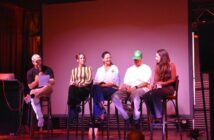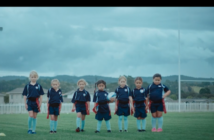
Alibi is a multi-platform crime drama set to keep New Zealanders intrigued over the next few weeks. It’s inventive, high-quality and opens up possibilities for New Zealand television online.
It’s the first long-form show from Plus6Four Entertainment, made up of well-known Kiwi actors Gareth Williams, Hannah Marshall and David de Lautour.
Released on Thursday on TVNZ Ondemand, it explores the murder of 17-year-old Jodie Hunter in the fictional, rural New Zealand town of Awatahi.
Each of the six 15 minute-ish episodes focuses on one of the suspects – the local gang leader, the priest, Hunter’s teacher, Hunter’s best friend, Hunter’s boyfriend and a tradesman. Each sits down with Detective Carter to explain where they were on the day Hunter is found dead in the bathtub.
Funded by TVNZ and NZ on Air, with Flying Fish Entertainment as executive producers, the show is intended to be watched all in one go, with the six non-linear episodes released at the same time.
“It’s a whole new way to consume the content,” says de Lautour.
“Each person’s experience will be different depending on which order they choose to watch it.”
A seventh episode will be released on 13 September – revealing who the murderer is – and Marshall and de Lautour hope the time gap creates discussions at the water cooler, the gym or the office about who could have done the crime.
Beyond the episodes
There is an interactive side to the series with one of the suspects having their own Instagram page, a community Facebook page, and the TVNZ website providing more information about the characters. The Instagram page – @freakymaliky – belongs to Hunter’s best friend, Malika Singh, 17, who wants to become a famous social media ‘influencer’ as a way to get out of her small hometown.
Marshall says it made the most sense to have Singh have an Instagram page, which went live a few weeks ago.
“It gives some more information around the story, giving little clues or different sides of the characters such as her and Jodie’s friendship, what’s happening in her life.”
There is also a Facebook page – ‘Awatahi Community News’ – with articles linked in some way to characters and the series’ backstory.
“One of the things about doing 15-minute episodes is that we couldn’t put in everything we wanted to – this gives you a bigger view or maybe will confuse you more,” says Marshall.
Another unique side to the show is that Detective Carter is not seen in the six episodes at all aside from touches of her hair, shoulder or hands.
As de Lautour explains, it really puts the person who is viewing the show in the seat of the detective.
“It brings into play your previous prejudices, or thoughts around that specific crime or that specific person. Each person viewing will have a different experience, not just because of the order they watch it in, but because they are ultimately different people.”
“It’s a different device that we were trying, and I think that it’s worked. It was a risk – particularly because we got one of New Zealand’s best actresses to play the role [Tandi Wright] – but you will see her face in the reveal episode,” says de Lautour.
Inspiration for Alibi
Marshall and de Lautour name-check Scandinavia dramas The Killing and The Bridge, Jane Campion’s hit Top of the Lake and HBO’s True Detective as a bunch of shows that inspired Alibi – but say they wanted this series to show a slice of life in small-town New Zealand.
“With the ambiguity of real-life crimes and the fascination – we wanted to create something that was gritty and grounded and true to life and kept you guessing,” says Marshall.
“We wanted to show different elements that can exist when you’re outside of a big town, and what people do to survive and the influences at play.”
Neither Marshall or de Lautour are from small towns – Williams is from Upper Hutt – but Marshall says something they were aware of when writing is that they didn’t want it to be generic or generalized, or have an Auckland-centric view.
“We wanted to show the stuff that’s not normally on our screens.”
For the series, de Lautour directed with Marshall and Williams producing, and Marshall also doing a cameo as teacher Natalie Park’s girlfriend.
The trio didn’t tell the majority of the cast who the murderer was – though the writers and heads of departments knew – and following cast and friend screenings in Los Angeles and Auckland, say it was interesting to see the theories coming out.

The mini-series was shot over 20 days in December, with the team giving themselves a little bit more time than traditional shoots due to a young cast and wanting to do lots of interesting coverage.
“Because it wasn’t going on network television, it was a bit more experimental and able to push some boundaries,” says Marshall.
The timing was helpful as it followed the filming of Westside in which de Lautour plays Ted West, meaning he could convince a few of the Westside crew to help out on the series.
While Awatahi could pass for any small, rural New Zealand town, Marshall and de Lautour explain it was actually filmed in Auckland, due to budget constraints, at spots such as Helensville, Riverhead and Oratia.
The music is an integral part of the show, with New Zealand songs opening each episode, and LA-based Kiwi musician Gin Wigmore doing the end credits.
Marshall says the featured musicians are a mix of new, up-and-coming artists with those more well-known ranging from Chelsea Jade to Louis Baker. She says there are no original songs, but it’s a chance to showcase and celebrate Kiwi artists.

A call back to New Zealand
Moving the focus to Plus6Four, Marshall and de Lautour explain the name comes from the international New Zealand dial code – a ‘call back’ to New Zealand that de Lautour was keen to use.
Marshall adds they, and Williams, started Plus6Four because they enjoyed working together.
“We’d made a short film a couple of years ago and really enjoyed the process and wanted to work together again and tell New Zealand stories internationally in a unique and different way – that was our ultimate goal.”
Marshall says the team wanted to capitalize on the fact that platforms – such Netflix, Amazon, Hulu – are available and so accessible.
“We [Marshall and de Lautour] live in LA and I’ve been away for a long time but the longer you’re away from home the more you really miss and appreciate what we have to offer here – not just in terms of cast and crew, but in landscapes, stories and point of view.”
“We want New Zealand stories on those platforms, New Zealand voices, a sense of what New Zealand is about,” adds de Lautour.
Marshall says Plus6Four feel very lucky to have the Flying Fish team on board.
“They’ve been so supportive…talking to James [Moore] early on, he said in the commercial world you are always looking for innovation and new ways and things come out quickly, and you’re trying to push boundaries – I thought that’s a good ethos to take into the drama world – push the boundaries.”
And the feeling is mutual from Flying Fish, with managing director and executive producer Moore commenting that the trio is a special group of filmmakers.
“Hannah, David and Gareth came to Fish on the hunt for a home and a production company partner. It really was a no brainer to have them on board and under our new Fish Entertainment umbrella, timing was perfect. They’ve quickly become family and we are already in development for several other projects with Plus6Four.”
This includes a second series in development for Alibi but, as de Lautour explains, the Jodie Hunter story will be all tied up completely in the seventh episode so the audience gets the satisfaction of finding out who did it and why. As for the next series, it will still be New Zealand-based, but a total different story.




